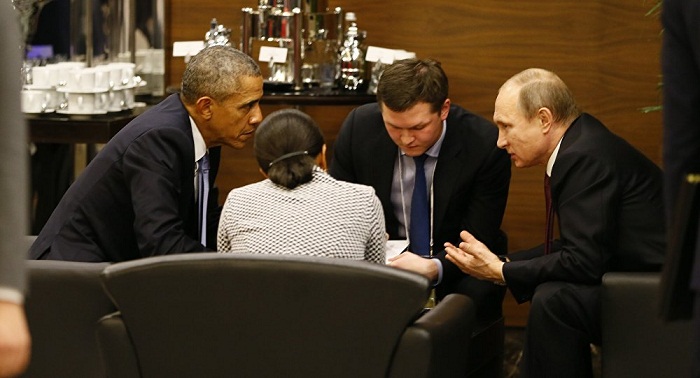Now, a year and a half later, the columnist is offering "A case for rapprochement with Russia." So what happened? Has the journalist come to the realization that Russian troops are nowhere to be found in Ukraine? Or perhaps he`s willing to admit that Crimea`s decision to break off from Ukraine and rejoin Russia was made by the peninsula`s residents themselves? Not quite.
Apparently, it`s the conflict in Syria which has Rachman searching for "a middle ground between entrenched Moscow and Washington."
A connoisseur of powerful, emotional imagery, the columnist recalls that "in the aftermath of the Paris attacks, two pictures sent a powerful message about how international politics are changing. One was of Barack Obama hunched in discussion in a hotel lobby with Vladimir Putin. The frosty body language of their previous meeting at the UN had given way to something more businesslike. The US and Russian presidents almost looked like colleagues. Picture number two, artfully released by the defense ministry in Moscow, was of a Russian bomb being loaded on a plane in Syria with the words "That`s for Paris" scrawled on the side."
"Together," Rachman notes, "the two images highlighted an interesting possibility. Might Russia and the West begin to bury their differences by making common cause in the war against ISIS? The idea horrifies many Russia analysts in the West and presents enormous complications. Nonetheless, it`s worth a try for a number of reasons."
Chief among them, the columnist suggests, is "the defeat of ISIS," which has "rightly" become "the top Western priority" after Paris and "the threat of further attacks to come."
And while Rachman is not willing to admit that perhaps it was Washington and Brussels who were wrong in Ukraine, he does offer the best argument he can muster, noting that at least now, "there have been some modest but important signs that Russia is backing off in Ukraine."
"Finally," the columnist writes, with "neither the West nor Russia [having] a monopoly of wisdom on the Syrian conflict…finding a middle ground between the entrenched positions of Moscow and Washington could help end the conflict."
Noting that there are many Russia critics who continue to imagine that "Russia ultimately presents a bigger menace to the world order than ISIS," Rachman suggests that this is "a hard argument to make to European and American publics at the moment, who can see that Islamist terrorists pose a direct and immediate security threat to the major cities of the West in a way that Russia does not."
The journalist emphasizes that he does not discount the Russia hawks` arguments that "taking the pressure off [Russia] now…might encourage future Crimeas," noting that "these arguments cannot be waved away."
Nevertheless, what he does do is suggest that a move toward rapprochement can be made, if it is "gradual and conditional…If the ceasefire in Ukraine is restored and holds, and Russia is constructive in Syria, then some alleviation of sanctions becomes much more likely in the first half of 2016."
Rachman recalls that "the fate of Mr. Assad remains a significant dividing line between the Western powers and Russia," with "the big regional powers…even more bitterly divided over this issue, with Iran backing Mr. Assad to the hilt and the Saudis and Turks demanding that he leave office."
And while he suggests, again without backing down from any Western stereotypes about governments they don`t favor, that "Western powers and their allies are right that Mr. Assad`s brutality has served as a rallying cry for Sunni Arabs and helped the jihadi cause," he admits that "the Russian response also has merit. Their argument is that any vacuum after the fall of Mr. Assad is likely to be filled by some mixture of violent chaos and Islamism –circumstances that could be designed for ISIS to thrive in."
Ultimately, Rachman suggests that the present "conditions on the ground in Syria and the experiences of Iraq and Libya make this Russian analysis hard to refute." In fact, he notes, "without really acknowledging it, the US has in any case moved gradually toward the Russian position, dropping its insistence on the immediate departure of Mr. Assad. The very real threat that both Russia and Western powers face from ISIS may now concentrate minds enough to force them to bridge their remaining differences over the fate of Mr. Assad."
The only question which remains is how long the Russia and Syria `hawks`, both in Western media and in the corridors of power, will continue their hardline stance, while Syria burns and Western cities continue to be threatened by Islamist terrorism.
The journalist suggests that "after the Paris and Sinai attacks, the undoubted strategic rivalry in the Middle East between Russia and the West should be trumped by a shared strategic and moral interest in the defeat of ISIS and the achievement of peace in Syria." Only time will tell whether such optimism is warranted.
More about:
















































